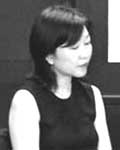|
張小虹,臺大外文系畢業,美國密西根大學英美文學博士,現任臺大外文系教授。著有《後現代女人:權力、慾望與性別表演》(1993)、《性別越界:女性主義文學理論與批評》(1995)、《自戀女人》(1996)、《慾望新地圖:性別同志學》(1996)、《性帝國主義》(1998)、《情慾微物論》(1999)、《怪胎家庭羅曼史》(2000)、《絕對衣性戀》(2001)、《在百貨公司遇見狼》(2002)、《感覺結構》(2005)、《膚淺》(2005)等書。
Hsiao-hung Chang is professor of Foreign
Languages and Literature at National Taiwan University. Her books
include Postmodern Woman: Power, Desire and Gender Performance (1993),
Narcissistic Woman (1995), Gender Crossing: Feminist Literary Theory and
Criticism (1995), Queer Desire: Mapping Gender and Sexuality (1996),
Sexual Imperialism (1998), Erotic Micropolitics (1999), Queer Family
Romance (2000), Absolutely Clothes-Crazy (2001), Encountering a Wolf in
the Department Store (2002), Structures of Feeling (2005), and Skin-Deep
(2005).
|
|
反文化研究
如果我不能跳舞,我就不要教文化研究。
將從「跳舞」的身體意象開始,回顧過去十年在臺灣大學教授通識課程的經驗,探討文化研究教學在現有學科架構中「手舞足蹈」的可能與不可能。
前期的課程設計以性別與同志研究為主軸,近期的課程設計以流行時尚與消費文化為重點,皆企圖將文化研究教學當成學院內外社會運動的實踐場域,強調文化批判在日常生活中的實踐與介入。
將循以下三個思考面向,回顧整理此開放給大學部學生自由選修的通識文化研究課程:
(1)如何以文化研究的「非人」想像「盜獵」通識課程的「全人」想像
(2)如何以「去政治化」的「再政治化」,發展後學運世代的校園微觀政治
(3)如何展開「知識-滋事-姿勢」由思考到行動、概念到身體的連結,凸顯「知識份子」與「知識微分子」之間可能的轉換。
Overturning Cultural Studies
If I cannot dance, I will not teach cultural studies.
I will start with the body image of dancing to review my experience
of teaching cultural studies courses in the General Education
Curriculum at National Taiwan University in the past decade. I
attempt to foreground the (im)possibility of "choreographing"
cultural studies within the current structure of academic disciples.
The courses offered by me in early 1990s center on gender and
queer studies; the more recent ones shift the focus to fashion
and consumer culture. By taking the pedagogy of cultural studies
as the field of enacting social movement inside/out academia,
these courses are all designed to turn cultural critiques into
social intervention and everyday practice.
There are three major aspects that I want to review these General
Education courses on cultural studies opened to all undergraduates.
(1) How to "poach" the "non-human" thinking of cultural studies
in the "universal man" thinking of General Education.
(2) How to "de-politicize" the party politics and "re-politicize"
the micropolitics in the post-student movement campus.
(3) How to map out knowledge, dissidence, and postures in the
linkage between thought and action, concept and body by tracing
the possible transformation from "intellectuals" to "molecular
intellectuals."
|

